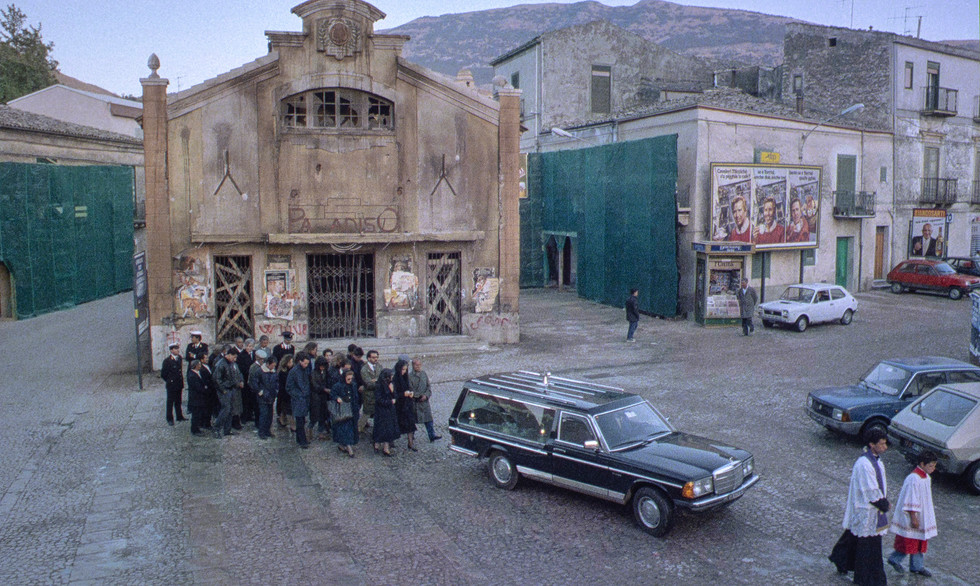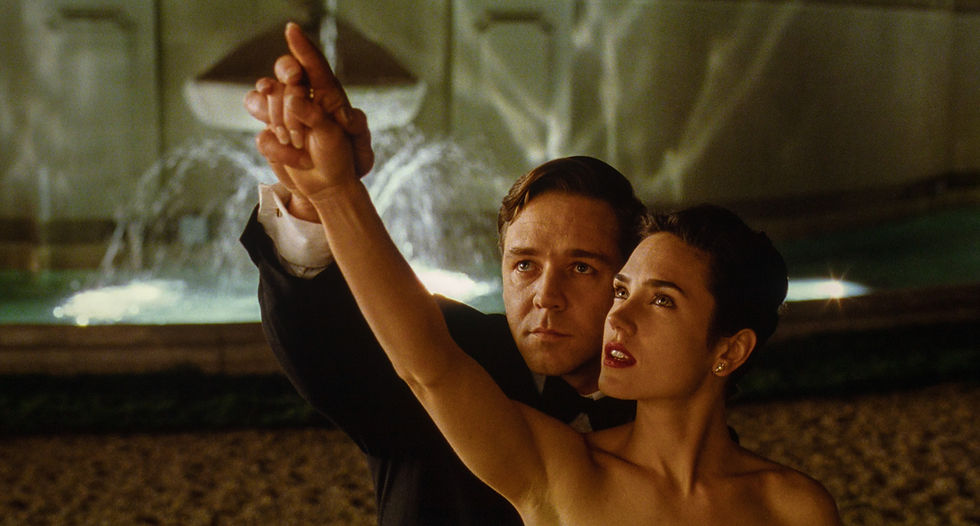Ode to movies, “Cinema Paradiso,” sparkles in 4K
- Peggy Earle

- Jan 13, 2021
- 5 min read
Updated: Jun 24, 2022
4K ULTRA HD REVIEW / HDR FRAME SHOTS

The charming Salvatore Cascio plays little Toto, a young apprentice to movie projectionist Alfredo played by Philippe Noiret.
(Click an image to scroll the larger versions)
“CINEMA PARADISO”
4K Ultra HD, Blu-ray; 1988; PG for brief sexuality Theatrical Cut and R for sexuality for Director’s Cut
Best extra: “A Dream of Sicily” documentary
IT’S A multiple-award winner. “Cinema Paradiso,” the first Italian film since Fellini’s “Amarcord” (1973) won an Oscar for Best Foreign Film in 1990, and also picked up the Cannes Film Festival’s highest prize among other prestigious awards. Now writer/director Giuseppe Tornatore’s semi-autobiographical gem has received a full 4K restoration from Italy’s premiere L’lmmagine Ritrovata film restoration lab in Bologna. Arrow Films, based in the U.K., financed the HDR/Dolby Vision grading of the theatrical cut.
It was the second feature film from then 32-year Sicilian filmmaker, who used frequent time jumps to tell the story of Salvatore “Toto” Cascio (Jacques Perrin), a successful movie director living in Rome who is called back to his little Sicilian hometown for a funeral. The deceased, Alfredo (Philippe Noiret), was once the projectionist in the town’s only movie theater but, most significantly, he was a sort of surrogate father to the young Toto, and mentor of all things cinema.
The flashbacks take us to the 1940s of Toto’s childhood as an altar boy in the local church, which has a movie theater attached to the parish. He spies on Father Adelfio, played by Leopoldo Trieste, who censors a screening of Jean Renoir’s French film “The Lower Depths” (1936). He rings a bell to signal to Alfredo with the location of the offensive scenes. Every kiss gets the ax. The town folks haven’t seen a kiss on the silver screen in twenty-plus years.
(1) “Cinema Paradiso” was filmed in Tornatore’s hometown of Bagheria, Sicily. (2) Middle-age Salvatore “Toto” Cascio (Jacques Perrin) learns of the death of his surrogate father and mentor Alfredo. (3-6) Young Toto continues to fall asleep during mass, but after the service, he watches Father Adelfio (Leopoldo Trieste) ring the censor bell during a screening to remove all offensive scenes.
British film scholar and author Pasquale Iannone writes in his enclosed essay featured in the 28-page booklet, the turning point of the film is when dozens of moviegoers are shut out of the screening of Mario Mattioli’s comedy, “The Firemen of Viggiù.” Alfredo decides to beam the movie into the theater and on the side of a building in the town square. While Toto and Alfredo watch the film from the window, the projector catches fire, destroying the building, and nearly killing the projectionist.
The story moves into Toto’s teenage years and his love for the beautiful, elusive Elena (Agnese Nano). Along the way, we learn how essential the movie theater had been to Toto – and all the village’s residents – and how, as a lively little boy, he was able to convince Alfredo to teach him all he knew about the projector and film.
VIDEO
The original camera negative (1.66:1 aspect ratio) was scanned in 4K for the restoration project. The Director’s Cut, running 50-minutes longer, was mastered in 2K, featured on the Blu-ray. Marks and scratches were removed from both.
The 4K version extracts a heavier dose of natural film grain throughout. Its overall clarity is superb – seen when the camera moves through the church bell tower toward an overview of the village square. You can count every single cobblestone below which is seen as children race through the square and villagers go about their everyday lives. Facial detail and costume textures are more detailed and clear – especially during brighter scenes. The HDR/Dolby Vision grading produces a more cinematic feel, as colors are natural without an orange cast and the blacks are deep and inky without losing detail.
(1) Looking down on the Sicilian village of Bagheria, during a flashback to Toto’s childhood. (2) Toto, center, entranced by what he sees on the silver screen. (3) Alberto and Toto, who is wearing his altar boy vestments. (4) When Toto’s box of salvaged film edits combusts, the ensuing fire destroys a family photograph of his father and mother. (5) Toto’s mother (Antonella Attili), infuriated by the fire, lashes out at the boy and also at Alberto, for his influence on her son.
AUDIO
The 4K disc includes the original mono and six-channel DTS-HD soundtracks, mostly directed toward the front speakers. English subtitles are provided. The score from Italian master Ennio Morricone, who composed all of Tornatore’s films, is “among his most lyrical and romantic,” says Iannone. He places it right up there with Morricone’s score for Sergio Leone’s “Once Upon a Time in America” (1984) and Brian De Palma’s “The Untouchables” (1987). The film’s love theme, which runs throughout the film, was actually composed by Morricone’s son Andrea.
EXTRAS
The set includes a commentary with Tornatore and Italian film critic Millicent Marcus. “A Bear and a Mouse in Paradise” and “The Kissing Sequence” are two featurettes that appeared in the 2009 Arrow DVD edition of “Cinema Paradiso.”
During Iannone’s essay, “Stolen Kisses: Tornatore’s Cinema Paradiso,” he calls the film, “A love letter to the cinema.” It was made during a transitional time in Italian filmmaking. “The mid-80s were the darkest years… any attempt to make films seemed impossible,” Tornatore recalls. In the tradition of French filmmaker Truffaut, he turned toward the “tender exploration of childhood,” Iannone says.
(1) In return for Toto helping him cheat on a school test, Alberto agrees to teach the boy how to operate the projector. (2&3) Like magic, Alberto uses light and mirrors to project a movie onto a building facade, so the townspeople who couldn't get into the theater can see it. (4) But the film catches fire in the projector, and Alberto is grievously wounded. (5&6) The spectators escape safely, but the theater is destroyed and the next morning the townspeople survey the damage.
The highlight bonus feature is the recently filmed “A Dream of Sicily,” in which Tornatore discusses his Sicilian hometown of Bagheria, his career, and the genesis of “Cinema Paradiso.” It has clips from his early documentaries about life in Bagheria, as well as from his other theatrical features such as “Starmaker,” “Malena,” and “Everybody’s Fine.” Tornatore says that being born on an island “accentuates the dreaminess of Sicily.”
With “Cinema Paradiso,” the writer/director says he intended “to narrate the fever of wanting to get into the theater.” He experienced films, he says, as a “time machine … especially for someone raised in a small, provincial town.” With his films, says Tornatore, he “searches in the Sicily of yesterday for the Sicily of today.” He believes that those who come from there “tend to love Sicily more from afar … and romanticize the things that go wrong.” He also adds that his themes are always the same – the idea that, for Sicilians, there is always the dilemma of whether to leave or stay: “It’s in our DNA.”
With excellent performances, especially by Noiret and the wonderful Salvatore Cascio as little Toto, beautiful cinematography, and a memorable score by Ennio Morricone, “Cinema Paradiso” is Tornatore’s timeless love letter to the art and magic of the movies.
— Peggy Earle
(1) Teenaged Toto is still obsessed with film, but this time prefers to create them from behind a camera. (2) He meets Elena (Agnese Nano), his first true love, in a high school hallway. (3) Alberto, scarred and blinded by the fire, gives Toto romantic advice.
(1&2) Toto steals a moment with Elena in church, since she's been forbidden to spend time with him. (3) Alberto and Father Adelfio (Leopoldo Trieste). (4) Local fishermen who don't want to pay to sit outdoors and watch a movie, steal a peek from their boats. (5) Alberto bids Toto farewell and advises him to seek his fortune in Rome and never return to Bagheria.
(1&2) Alberto’s funeral. (3) Toto looks through the rubble inside the now-defunct “new” Cinema Paradiso and gazes wistfully at the projection booth, which holds so many happy memories.
TRAILER without 4K color grading






























































Comments